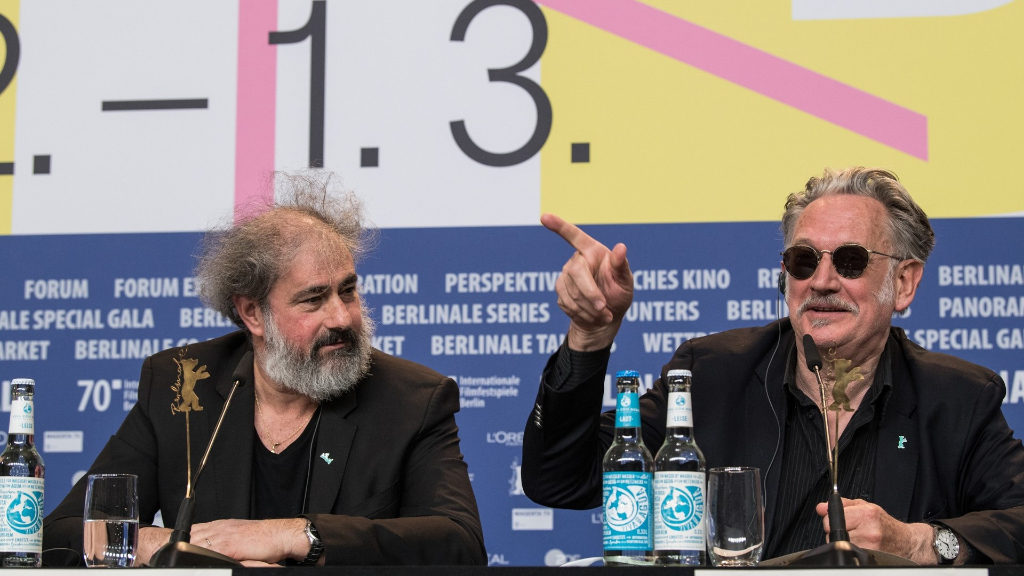“We’re able to have fun without being locked into our mobile phones”: An interview with Delete History directors Benoît Delépine and Gustave Kervern

After directing ten pictures together, the endlessly inventive French filmmaking duo Benoît Delépine and Gustave Kervern might be calling it a day. That tenth film is Effacer l’historique, a wittily pessimistic comedy about a group of friends in an anonymous slice of French suburbia who attempt to fight back after they come to the collective realisation that technology and wanton consumerism is robbing their lives of pleasure while promising the opposite. The film premieres in competition at the 2020 Berlinale, where we spoke to the pair about consumerism, the secret of French comedy… and sperm.
Effacer l’historique is the tenth time you have worked together, after first co-directing Aaltra back in 2004. What does the future hold for your creative partnership?
Gustave Kervern: In the beginning our goal was to make ten films together, and we’ve done it – the idea was to stop. It’s true that they are ten films about Don Quixote types – all fighting against the windmills. And now that we’ve gotten to that goal, we have these ten different stories – although they are the same, so to speak, and we are nearly sixty years old, therefore we change, or we stop making films.
Benoît Delépine: The idea was to shoot the first film in Picardy, which is where we set Aaltra, and that’s the region where I was born, and we’ve always dreamed of ending by making one film in Gustave’s native country, which is the Mauritius Islands, and that’s what we did.
What is it about French comedy, and even French cinema overall, that translates so well – why is it so popular all over the world, perhaps more so than other films not in English?
BD: I wouldn’t know which ingredient makes French comedy so successful abroad. But this is also the case with Spanish comedy, to a certain extent. Probably the reason, which is also undoubtedly true for our films, is that when you deal with social issues, they are the same all over the place – all over the world. That’s the case again with our film – because the internet is something we deal with in all countries. You know the cultural French exception – the system that all films in France, all films that are released in France, 60% of these are made in the US. But there’s a tax, which is then used to finance French cinema. This is what allows 300 films to be produced in French every year, and of course many of these productions are comedies, which appeal to a wider audience – and they’re easier, in a way. This is a system of film funding that exists in France, but it is the exception, and this is the reason why this system does not exist in Italy, or in England, or even in Germany. The reason why it’s an exception is because the state wants France to be the exception.
There’s a pessimistic tone to your work. Do you really feel that the world is quite so messed up?
GK: Yes, unfortunately you cannot help but be pessimistic. Although we make comedies, we are pessimistic – just look what is happening with the Coronavirus. Those are the real problems we are dealing with, and we are dealing with it globally, so we are all scared, and the internet is a global problem, so to speak. We are somehow ruled by fear and by anxiety, but it’s true. For instance, I have a 17-year-old son and a 14-year-old daughter, and they are very aware of the problems we are dealing with nowadays, but despite that – they are still happy. But if you are a grown-up, you cannot help being pessimistic, and even the film is pessimistic. Younger generations think about those issues a lot, and the environmental issue is also a problem, for example. Are you a pessimist?
More and more, yes.
BD: Also with the idea of having self-driving cars. We can all drive, so why should we have self-driving cars that will consume an absurd amount of energy? We are here talking, we’re not consuming so much, because human beings are equipped with imagination and reasoning – they’re able to enjoy, to have fun, without necessarily locked into the internet or watching their mobile phones. And what is the sense of always having these devices in our hands and consuming energy for data centres to store the old videos and photos we exchange – we can change our lifestyle, and just walk and talk and do what we are made for as human beings.
In the film it’s said that with nothing, everything is easier. Do you believe this yourselves?
GK: As I was saying, I’m from the Mauritius Islands, and I’m now 57, and if you think about the scene in the film where he’s on the beach, holding a shell to his ear – there are none of these on the islands anymore. There are no urchins, there are no fish, no crabs – nothing. It’s a dead sea, completely empty, no animal species anymore, and that happened over 50 years. How can I not be pessimistic? Tourists go there, but they don’t care. There’s sand, there’s sea, but that is the reality of it.
Effacer l’historique features a memorable joke involving ejaculation. Was this a deliberate homage to the Farrelly Brothers and There’s Something About Mary?
BD: Yes, those are two geniuses – no doubt about that. But now every time there’s sperm in a film – it’s them. But no, we have our own.
GK: French sperm!
BD: Rich sperm!
I’ll take your word for that.
Oliver Johnston
Image: Kervern (L) and Delépine at the Delete History press conference © Berlinale
Delete History does not have a UK release date yet.
Read more reviews from our Berlin Film Festival 2020 coverage here.
For further information about the event visit the Berlin Film Festival website here.
Watch the trailer for Delete History here:


























Facebook
Twitter
Instagram
YouTube
RSS